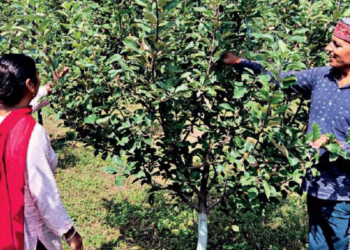TAD NewsDesk, NEW DELHI: On 23rd September, Union Minister of Agriculture and Farmer Welfare Narendra Singh Tomar took over the Ministry of Food Processing Industries. The Cabinet Minister already holds the charge of Rural Development and Panchayat Raj Ministries in India.
“The ministry is making all efforts and contributing towards the creation of new opportunities of employment for youth, bringing profits to farmers by offering remunerative prices to them and making the goods available for its consumers,” he said stressing on the fact that the food processing industry is still progressing.
Tomar received a warm welcome by the Minister of State for Food Processing Industries Rameswar Teli and Secretary at the ministry Pushpa Subrahmanyam. The minister began his day by convening with all the senior officials and evaluating the schemes under the ministry.
He was handed over the Food Processing Portfolio after Akali Dal leader Harsimrat Kaur Badal tendered her resignation from the post. Her resignation was an act of protest against two farm sector reform bills that met heavy criticism by the opposition and were denounced by farmers countrywide.
“I have resigned from Union Cabinet in protest against anti-farmer ordinances and legislation. Proud to stand with farmers as their daughter & sister,” she had tweeted.
The President of India acknowledged the resignation submitted by Badal. She ceased to be a part of the Union Council of Ministers, with immediate effect, under clause (2) of Article 75 of the Constitution.
“Further, as advised by the Prime Minister, The President has directed that Shri Narendra Singh Tomar, Cabinet Minister, be assigned the charge of the Ministry of Food Processing Industries, in addition to his existing portfolios,” it added.
The Farm Bills were opposed by Badal’s party Shiromani Akali Dal (SAD) because the legislations aspire to liberalise agricultural markets but will continue to ally with NDA.
“These bills have many provisions that go against farmers’ interests. We have repeatedly asked the government that please address the apprehensions of farmers, but the government had done nothing. Therefore, I oppose these bills,” SAD chief Sukhbir Singh Badal said.
On 20th September, the Parliament passed two farming-related legislations:
- Farming Produce Trade and Commerce (Promotion and Facilitation) Bill, 2020
- Farmers (Empowerment and Protection) Agreement of Price Assurance and Farm Services Bill, 2020.
The two bills passed in the Lok Sabha will now be tabled in the Rajya Sabha. The National Democratic Alliance government hailed the two farm-related legislation passed by Parliament as “historic”. However, the protests by farmers’ groups, especially in Haryana and Punjab tell a different story. Farmers’ unions have called for a nationwide strike, and as a result, Punjab’s Amritsar and Firozpur districts are already witnessing a 3-day ‘Rail Roko’ protest staged by the state’s farmers. Support to the protesting farmers has come from activists opposing the contentious bills that may leave cultivators susceptible to exploitation. The prime concern distressing the farmers is the absence of any mention of Minimum Support Price. MSP guaranteed to cultivators is a base price fixed by the government to protect the farmers from exploitation.
“Dear farmers, beware of lies being spread by the opposition parties related to farm bills.
Indian farmers of 21st centaury will cultivate and sell their produce freely without any restrictions.”,
Tomar tweeted that pacifying the farmers that MSP will continue to be a part of the policy.
However, the raging protests led by farmers give the impression that they will need more than a tweet to feel reassured. The government needs to actively listen to the concerns raised by the farmers and incorporate their demands in policies that affect them.













